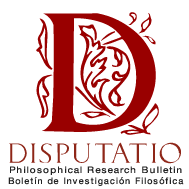Robert B. Brandom
University of Pittsburgh, United States of America | rbrandom@pitt.edu
Received: 20-May-2017 | Accepted: 28-August-2017 | Published: 30-June-2019
Disputatio [Jun. 2019], Vol. 8, No. 9, pp. 00-00 | DOI: 10.5281/zenodo.2631649
Article | [EN/SP] | Full Text | Statistics | Copyright Notice [es] | Vol. 8 No. 9
How to cite this article:
Brandom, Robert B. (2019). «Assertion (Afirmación)». Disputatio. Philosophical Research Bulletin 8, no. 9: pp. 00-00.
Abstract | In this paper, written more than ten years before Making it Explicit, I take a close look at the pivotal role which assertions play in human interactions. Tending a bridge from the Kantian theory of judgements to Dewey’s pragmatic philosophy, with the Fregean notion of conceptual content providing the pillars, and relying on the teachings drawn from the later Wittgenstein’s philosophy as keystones, I begin by questioning the dominant view of representationalism in analytical philosophy after Russell, Carnap and Tarski. It is here that I begin weaving the conceptual network that will eventually blossom into the program of pragmatic rationalism with logical inferentialism and semantic expressivism as pivotal notions, manifest in our game of asking for and giving reasons. It is for these reasons that I agree that a bilingual version of this early piece seems a good starting point for the reflections on what unites and what divides la philosophical visions of Wittgenstein and my own.
Keywords | Assertions · Content · Judgement · Inference · Practice.
![]()
Afirmar
Resumen | Me dedico en esta pieza, redactada más de diez años antes de Making it Explicit, a tomar bajo la lupa el papel central que las afirmaciones juegan en las interacciones humanas. Tendiendo un arco de las teorías de juicio de Kant hasta el pragmatismo de Dewey, apoyado en la noción de contenido conceptual desarrollado por Frege e inspirado en las enseñanzas de un Wittgenstein tardío, me pongo a cuestionar el representacionalismo dominante en la filosofía analítica después de Russell, Carnap y Tarski. Es aquí donde empiezo a tejer como alternativa la red conceptual teórica que madurará posteriormente en el pragmatismo racional basado en el inferencialismo lógico y expresivismo semántico que se manifiesta en nuestra práctica de pedir y dar razones. Es por esto que una versión bilingüe de este antiguo trabajo también a mi me parece un buen punto de partida para una reflexión acerca de qué es lo que une y qué es lo que separa las visiones filosóficas de Wittgenstein y la mía.
Palabras Clave | Afirmaciones · Contenido · Juicio · Inferencia · Práctica.
References
Baier, Kurt (1966). “Responsibility and Freedom,” In Ethics and Society, edited by Richard T. De George. Garden City, NY: Anchor Books.
Brandom, Robert (1966). “Truth and Assertibility.” Journal of Philosophy 73, no. 6: pp. 137-149.
Brandom, Robert (1979). “Freedom and Constraint by Norms.” American Philosophical Quarterly 16, no. 3: pp. 187-196.
De George, Richard T. (ed.) (1966), Ethics and Society. Garden City, NY: Anchor Books.
Dummett, Michael (1973). Frege: Philosophy of Language. London: Duckwork.
Frege, Gottlob (1979). Posthumous Writings, edited by Hans Hermes, Friedrich Kambartel, and Friedrich Kaulbach. Oxford: Blackwell.
Grogono, Peter (1980). Programming in Pascal. Reading, MA: Addison-Wesley.
Rorty, Richard (1970). “Incorrigibility as the Mark of the Mental.” Journal of Philosophy 67: pp. 399-424.
Searle, John (1969). Speech Acts, London: Cambridge University Press.
Sellars, Wilfrid (1963). “Empiricism and the Philosophy of Mind”, In Science, Perception, and Reality. New York, NY: Humanities Press.
© The author(s) 2019. This work, published by Disputatio [www.disputatio.eu], is an Open Access article distributed under the terms of the Creative Commons License [BY–NC–ND]. The copy, distribution and public communication of this work will be according to the copyright notice. For inquiries and permissions, please email: boletin@disputatio.eu.
